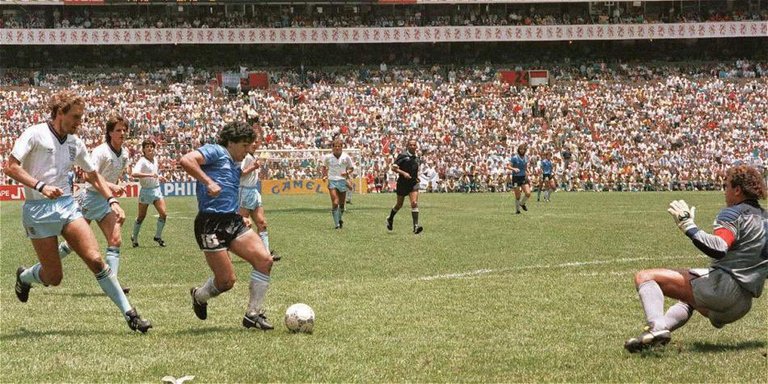Día del futbolista (SPA-ENG)

Sinceramente no se en cuantos países del mundo se conmemora a los futbolistas, sí sé que en el mío se celebra su día y desde hace muchos años; aunque busqué de varias formas, consultando diversas fuentes confiables y oficiales, no pude encontrar en qué momento comenzó ese homenaje a todos los jugadores del deporte más popular en la Argentina.
El día del futbolista argentino se celebraba el 14 de mayo de cada año, pero desde agosto del 2020 y por autorización de la AFA cambió al 22 de junio y hay una historia que relaciona ambas fechas debido a partidos oficiales de la selección nacional ante un mismo rival, la que sigue es la historia.
El 14 de mayo de 1953 la selección argentina recibía en un partido amistoso y preparatorio para el mundial del año siguiente a disputarse en Suecia, a la selección de Inglaterra con la cual arrastraba una rivalidad notoria que aún perdura en nuestros días. En aquel tiempo Inglaterra era una de las más fuertes selecciones en todo el mundo y había vencido en Wembley a los albicelestes en 1951 por 2 a 1, aquí en mi país se consideró ese match a disputarse en el estadio Monumental de Buenos Aires como una revancha del acontecido 2 años atrás.
En el encuentro descolló Ernesto Grillo, por entonces jugador de Independiente de Avellaneda, la crónica del encuentro dice que cuando el encuentro estaba todavía igualado el mediocampista tomo la pelota y luego de eludir a varios miembros de la defensa inglesa definió desde un ángulo muy cerrado ante el estupor del arquero inglés que no creyó posible que la pelota ingresara al arco desde esa posición tan difícil; más tarde Grillo convertiría un segundo gol colaborando de esa manera con el triunfo final de Argentina por 3 a 1. Aquel primer gol de Grillo dio la vuelta al mundo con el nombre de "gol imposible", en homenaje a ese triunfo y la gran actuación de Grillo, la AFA instituyó tiempo después el 14 de mayo como el día del futbolista argentino.

Solo a modo de información adicional debo agregar que en 1954 Argentina decidió no participar del mundial de Suecia por motivos difíciles de explicar y de entender hoy en día. Quizás por motivos similares, Inglaterra jamás reconoció esa derrota como oficial.
La historia tuvo un vuelco en 1986, en el mundial de México, allí apareció en su máximo esplendor la magia de Diego Armando Maradona para llevar de la mano a la Argentina a su segunda conquista ecuménica, el 22 de junio de aquel año el 10 convirtió el "gol del siglo", como se conoce mundialmente esa conversión que arrancó en mitad del campo y luego de eludir a 7 rivales, incluyendo al arquero, culminó en el segundo gol de la selección albiceleste justamente ante Inglaterra y nada menos que para darle paso a las semifinales.
La rivalidad entre ambas selecciones y la memoria de la cercana guerra de Malvinas hicieron de esa una de las mayores gestas de la selección nacional, aunque tal situación lejos estaba de equiparar algo tan grave, triste y desolador como una conflagración donde hubo centenares de muertos y heridos.

En el 2020 se eligió el gol de siglo por encima del gol imposible y la celebración del día del futbolista argentino migró hacia esta nueva fecha.
Grillo había fallecido varios años antes y no creo que hubiera puesto reparos en ese cambio.
Footballer's Day
Honestly, I don't know how many countries around the world commemorate soccer players. I do know that their day has been celebrated in my country for many years. Although I searched several ways, consulting various reliable and official sources, I couldn't find out when this tribute to all the players of Argentina's most popular sport began.
Argentine Soccer Players' Day used to be celebrated on May 14th each year, but since August 2020, with authorization from the AFA (Association of Footballers), it has been changed to June 22nd. There is a story linking the two dates due to official matches played by the national team against the same opponent. The following is the story.
On May 14, 1953, the Argentine national team hosted the England national team in a friendly match in preparation for the following year's World Cup in Sweden. The team had a notorious rivalry with the team that still endures to this day. At that time, England was one of the strongest national teams in the world and had defeated the Argentines 2-1 at Wembley in 1951. Here in my country, the match, played at the Monumental Stadium in Buenos Aires, was considered a rematch of the one that had taken place two years earlier.
Ernesto Grillo, then a player for Independiente de Avellaneda, stood out in the match. The match report says that when the game was still tied, the midfielder took the ball and, after eluding several members of the English defense, finished from a very tight angle, to the astonishment of the English goalkeeper, who didn't believe the ball could enter the goal from such a difficult position. Grillo would later score a second goal, contributing to Argentina's 3-1 victory. That first goal by Grillo became known worldwide as the "impossible goal." In honor of that victory and Grillo's outstanding performance, the AFA later established May 14th as Argentine Footballers' Day.
Perhaps I should also add that in 1954, Argentina decided not to Just for the record, I should add that in 1954, Argentina decided not to participate in the World Cup in Sweden for reasons that are difficult to explain or understand today. Perhaps for similar reasons, England never officially recognized that defeat.
History took a turn in 1986, at the World Cup in Mexico. There, Diego Armando Maradona's magic appeared in all its splendor, leading Argentina to its second ecumenical triumph. On June 22 of that year, Maradona scored the "goal of the century," as the goalkeeper, who evaded seven opponents, including the goalkeeper, became the Argentine national team's second goal against England, no less, to advance to the semifinals.
The rivalry between the two teams and the memory of the nearby Falklands War made this one of the national team's greatest achievements, although such a situation was far from equating something as serious, sad, and devastating as a conflagration that left hundreds dead and wounded.
In 2020, the goal of the century was chosen over the impossible goal, and the celebration of Argentine Footballers' Day migrated to this new date.
Grillo had passed away several years earlier, and I don't think he would have objected to that change.
Héctor Gugliermo
@hosgug
Congratulations @hosgug! You have completed the following achievement on the Hive blockchain And have been rewarded with New badge(s)
You can view your badges on your board and compare yourself to others in the Ranking
If you no longer want to receive notifications, reply to this comment with the word
STOPThank you @hivebuzz
You're amazing @hosgug! Your dedication and hard work have paid off with a post every day of the week. Keep buzzing!
No sabía lo de Grillo, pero lo de Diego sí. Siempre he dicho que por él comencé a ver y aprender este deporte.
Ese gol y el encuentro general lo recuerdo,.a pesar de los 39 años que va a cumplir.
En Cuba, el día del futbolista se celebra el 11 de diciembre en homenaje al primer partido desarrollado en nuestro país acontecido el 11 de diciembre de 1911.
Gracias por compartir.
Feliz lunes y mejor semana.
Salud y saludos.
Eso es una sorpresa para mí, no sabía que era el Día del Futbolista. Muy buen artículo; debe ser un desafío escribir sobre fútbol de hace un tiempo atrás.
Si se ha vivido lo suficiente hay muchos temas que tratar del fútbol de antes, por supuesto una buena memoria ayuda y también las bibliotecas de los diferentes clubes y de la propia asociación del fútbol. Puedes obtener muchos datos de la web también y de las IA aunque no siempre son lo exactas y precisas que te quieren hacer creer.
Saludos y gracias por tus comentarios @isaacmartiubeda
Excelente artículo. Sería interesante leer cómo jugaba Maradona y escribir sobre ello, ya que no lo vi jugar.